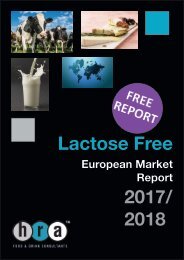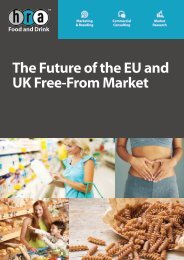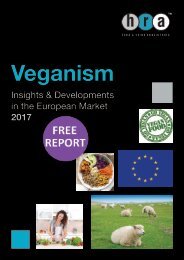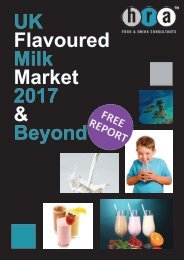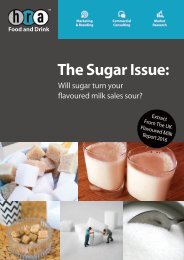FREE-UK-Flavoured-Milk-Report-2016-2017
The backdrop to the UK flavoured milk market is one of relentless change. The removal of the EU milk quotas, the transition to a Western-type diet by emerging economies, the UK sugar debate and the booming sports nutrition industry are all aspects of change that create both challenges and opportunities for the UK flavoured milk market. HRA Food and Drink Marketing has developed this report as a map to guide industry stakeholders. Although volume growth in 2014 was slightly lower than in previous years, the flavoured milk market still has plenty of room for product innovation and development. Overall, we expect the UK flavoured milk market to continue to grow over the medium term, but not without improving its nutritional profile. The sugar debate reached new heights when, in October 2015, Public Health England released a document suggesting Government intervention in the form of a sugar tax (levy). As a consequence, product reformulation has become a priority for all serious players in the market.
The backdrop to the UK flavoured milk market is one of relentless change. The removal of the EU milk quotas, the transition to a Western-type diet by emerging economies, the UK sugar debate and the booming sports nutrition industry are all aspects of change that create both challenges and
opportunities for the UK flavoured milk market.
HRA Food and Drink Marketing has developed this report as a map to guide industry stakeholders. Although volume growth in 2014 was slightly lower than in previous years, the flavoured milk market still has plenty of room for product innovation and development.
Overall, we expect the UK flavoured milk market to continue to grow over the medium term, but not without improving its nutritional profile. The sugar debate reached new heights when, in October 2015, Public Health England released a document suggesting Government intervention in the form of a sugar tax (levy). As a consequence, product reformulation has become a priority for all serious players in the market.
You also want an ePaper? Increase the reach of your titles
YUMPU automatically turns print PDFs into web optimized ePapers that Google loves.
<strong>UK</strong>#FLAVOURED#MILK#<strong>2016</strong>217#<br />
#<br />
<strong>UK</strong>.<br />
Easy access to European labour market.<br />
The Framework Programme 7 (now<br />
Horizon 2020) is the EU’s research<br />
programme which provides funds for<br />
research into key technologies. The <strong>UK</strong><br />
has the second largest budget share of<br />
this after Germany.<br />
Leaving the EU and being in EFTA or EEA<br />
instead often means having to abide by<br />
many of the same rules and having to pay<br />
contributions without the power to shape<br />
them.<br />
If the <strong>UK</strong> does leave, relaxing high EU food<br />
standards to lower production costs will be<br />
difficult as exports to the EU will still need<br />
to meet these standards.<br />
EU trade agreements with the rest of the<br />
world increase the <strong>UK</strong>’s market access.<br />
This has certainly been influential in<br />
increasing the <strong>UK</strong>’s agri-food exports to<br />
international countries.<br />
6.17 Social<br />
Supporting British farmers<br />
#<br />
To Gain Access<br />
Purchase The Full<br />
<strong>Report</strong> Now<br />
The <strong>UK</strong> did trade successfully with<br />
Europe in the post-war period before<br />
entering the EU.<br />
Leaving the EU will likely result in a<br />
devaluation of Sterling for a sustained<br />
period. This would be overall good for <strong>UK</strong><br />
food and drink exports (though not<br />
imports).<br />
In recent years, the supermarket price wars using milk as a loss leading<br />
product has had a significant impact on farmers’ profitability through the<br />
devaluation of dairy. This has led to concerns for farmers welfare within<br />
sections of the <strong>UK</strong> population and this has been mostly clearly exemplified<br />
by Morrissons’ <strong>Milk</strong> for Farmers brand which allows customers to voluntarily<br />
pay a premium to pass back to dairy To Gain farmers. Access The following public outcry<br />
upon the realisation that this Purchase premium is The actually Full shared among Arla’s<br />
continental farmers as well rather than just their <strong>UK</strong> farmers as the packaging<br />
implies illustrates the public desire to<br />
<strong>Report</strong><br />
support ‘local’.<br />
Now<br />
This desire to support <strong>UK</strong> dairy farmers is closely linked to the growing trend<br />
for buying locally produced products. This trend has led to growth in<br />
popularity of farm shops and farmer’s markets. This rising popularity is<br />
perfectly illustrated by advertising from shops such as Lidl with their Lidl<br />
© <strong>2016</strong> Teepee Limited. All Rights Reserved.<br />
167



